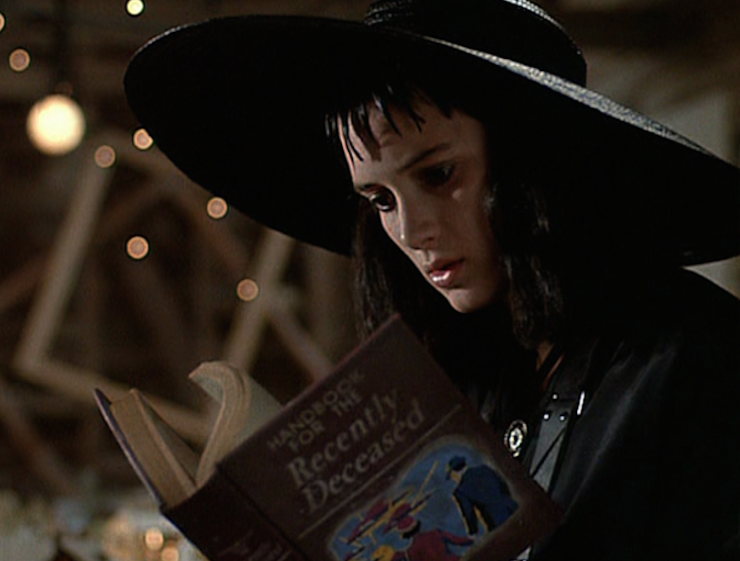One of the best things about working at Tor.com is that we get to spend so much time immersed in the science fictional and fantasy worlds that we love—from the books, comics, and movies that we grew up on through the newest releases of the year, we tend to eat, sleep, and breathe SFF both in and out of the office. As voracious readers, though, we also like to stretch our wings and venture into other literary genres, and so we thought we’d share some recommendations from our recent forays into history and historical fiction, biography, anthropology, criticism, and more. We hope that you’ll share some of your own suggestions in the comments, and let us know what other genres help to round out your TBR pile!
Bridget McGovern:
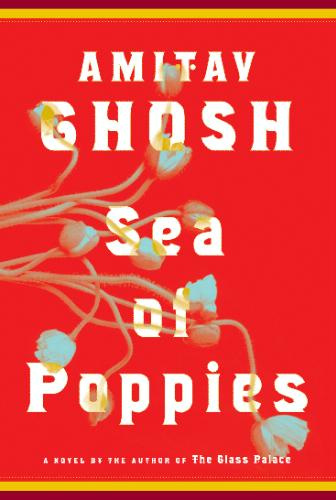 I tend to read a lot of history, historical fiction, biography, and works that occasionally blur the line between those genres. I’m a big fan of Hilary Mantel (particularly her Cromwell trilogy-in-progress) and Kate Summerscale (The Suspicions of Mr. Whicher and The Queen of Whale Cay). I recently devoured my way through The Ibis trilogy by Amitav Ghosh, set mainly in India and China in the years leading up to the First Opium War; in many ways, it’s a gorgeous exercise in worldbuilding that any fan of fantasy will appreciate. And the role that language plays in these books is fascinating, as the large cast of characters endeavor to communicate across a web of different languages, dialects, and slang, leading to a lot of slippery business with puns and idiomatic misunderstandings; the results are sometimes hilarious (especially early on), but can also be tragic on both an individual level and a larger cultural/historical scale—all told, it’s just a brilliant, masterful work of storytelling.
I tend to read a lot of history, historical fiction, biography, and works that occasionally blur the line between those genres. I’m a big fan of Hilary Mantel (particularly her Cromwell trilogy-in-progress) and Kate Summerscale (The Suspicions of Mr. Whicher and The Queen of Whale Cay). I recently devoured my way through The Ibis trilogy by Amitav Ghosh, set mainly in India and China in the years leading up to the First Opium War; in many ways, it’s a gorgeous exercise in worldbuilding that any fan of fantasy will appreciate. And the role that language plays in these books is fascinating, as the large cast of characters endeavor to communicate across a web of different languages, dialects, and slang, leading to a lot of slippery business with puns and idiomatic misunderstandings; the results are sometimes hilarious (especially early on), but can also be tragic on both an individual level and a larger cultural/historical scale—all told, it’s just a brilliant, masterful work of storytelling.
I also have to recommend Alan Sepinwall’s The Revolution Was Televised to anyone who enjoys truly smart, entertaining pop cultural criticism. It covers twelve of the most influential TV dramas of the last couple of decades (including Buffy, Lost, and Battlestar Galactica), with plenty of behind-the-scenes input from the writers, showrunners, and producers responsible for creating—and occasionally blamed for destroying—some of the best storytelling in any medium in recent memory.
Chris Lough:
The End of Men by Hanna Rosin
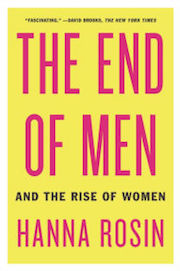 Sorry/not sorry, guys. Although, it should be noted that the title of Rosin’s non-fiction book is extremely hyperbolic, meant to stop you in your tracks, and the cover synopsis is so overblown that this sentence is the only one that actually describes the content of the book:
Sorry/not sorry, guys. Although, it should be noted that the title of Rosin’s non-fiction book is extremely hyperbolic, meant to stop you in your tracks, and the cover synopsis is so overblown that this sentence is the only one that actually describes the content of the book:
With wide-ranging curiosity and insight unhampered by assumptions or ideology, Rosin shows how the radically different ways men and women today earn, learn, spend, couple up—even kill—has turned the big picture upside down.
The End of Men is essentially a large collection of data that studies social systems by looking at results for males and females separately. Some of the conclusions are what you’d expect–women are still offered less money than men–but some of the conclusions are startling. The End of Men doesn’t offer a road map to, you know, ending men. It doesn’t rejoice in the victory of one gender or another, it simply points out that dynamics in education, the work force, and economics are changing, and that men are not keeping up. By grouping all of this data together, you start to understand the terror propelling people who call themselves “Men’s Right Activists.” What used to come easy isn’t so easy anymore, and the “competition” is heating up.
I’d also like to slow clap the cover designer for this book, for taking the hyperbolic title and coating it in pastel colors. It is a taunt to anyone outraged by the title but too dumb to flip through the actual book. Here come them wimmins to take your rights, the cover design says, and if you believe this then you are literally judging this book, and probably everything, by its cover. It’s brilliant in its simplicity. (It’s also possible that I’m giving the cover way too much credit, and that it’s pastel because the author is female.)
I mostly read non-fiction when not reading genre fiction, and The End of Men struck me in particular, because a lot of what it demonstrates through data is supported by my anecdotal experiences, especially in school. Gender balances are shifting in a wide variety of areas, and Rosin’s book presents a lot of convincing causal data as to why.
Stefan Raets:
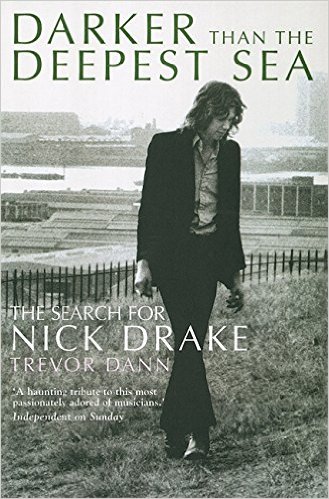 In the last few years, most of my genre reading has been for review. Whenever I read something just for fun, it tends to be either a reread of an old favorite, or something completely outside of the genre. Lately, I’ve been going for nonfiction about my two other nerd obsessions: music and history. Here are two recent favorites:
In the last few years, most of my genre reading has been for review. Whenever I read something just for fun, it tends to be either a reread of an old favorite, or something completely outside of the genre. Lately, I’ve been going for nonfiction about my two other nerd obsessions: music and history. Here are two recent favorites:
Darker Than the Deepest Sea by Trevor Dann, being a biography of the musician Nick Drake. There’s some wonderful detail about Drake’s early life, and the book really puts his shocking decline at the end of his life in perspective, but if I’m to be honest, my favorite bit is the final section, where Dann analyzes all of Drake’s songs and includes the unusual guitar tunings Drake was so fond of.
The Forsaken by Tim Tzouliadis, which is an account of the lives of the many Americans who emigrated to Russia in the first half of the 20th century. During the Great Depression, the U.S. economy was in ruins, while Russia was stabilizing and prospering after the upheaval of the October Revolution. A thriving American immigrant community in Russia, complete with baseball leagues and English language newspapers, was later decimated by the Stalinist regime and more or less forgotten by the home country.
Leah Schnelbach:
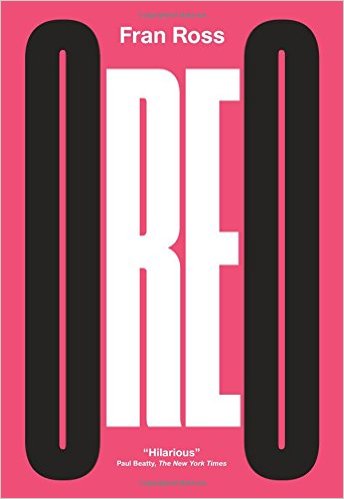 I’ve made it a bit of a tradition since coming to Tor.com that I spend the time between Christmas and New Year’s reading something that is resolutely non-SFF. I also try to read (on paper) and ignore TV, internet, and movies for at least a few days. Last year the book was the giant Jim Henson biography, which was fantastic but… well, we all know how that story ends. This time I started my year in a perfect way by reading Fran Ross’ Oreo, a criminally overlooked novel from 1974.
I’ve made it a bit of a tradition since coming to Tor.com that I spend the time between Christmas and New Year’s reading something that is resolutely non-SFF. I also try to read (on paper) and ignore TV, internet, and movies for at least a few days. Last year the book was the giant Jim Henson biography, which was fantastic but… well, we all know how that story ends. This time I started my year in a perfect way by reading Fran Ross’ Oreo, a criminally overlooked novel from 1974.
Here is what Oreo is: a quest story; a re-telling of the Theseus myth; a tour through mid-70’s Black culture; a reckoning with both Black and Jewish heritage; feminist; queer-friendly; a love letter to the power of Yiddish; the funniest book you will ever read.
Here is what Oreo is not: sad; depressing; traumatic; reeling; hand-wringing; overwrought; boring.
If you’d like a plot description, biracial Christine Clark (accidentally nicknamed ‘Oreo’ by her grandmother – it’s a long story) decides to leave the safety of Philadelphia and journey into the labyrinth of New York in search of her Jewish father, and a picaresque adventure ensures. The book fell through the cracks when it was published. The book was rediscovered by the scholar and poet Haryette Mullen, and finally reissued by New Directions last summer. Author Danzy Senna sums up the wonderfulness of the book in her introduction to that edition, saying:
As in the best satire, nobody in “Oreo” is safe; nobody is spared. The humor is low at times, scatological and plain silly, and the humor is high, sophisticated wordplay and clichés flipped on their heads. Ross is a hard sell for February, Black History Month, and a hard sell for March, Women’s History Month. Hers is a postmodern text; it is a queer text; it is a work of black satire; it is a work of high feminist comedy; it is a post-soul text. Her novel is multifaceted and multilingual, making it an awkward presence on the landscape of American fiction, where “ethnic” literature can be put in kiosks like dishes at a food fair, and consumed just as easily.
Personally, I think the book would have been just as tough to publish now. It’s too inventive and messy and weird, which is what makes it a brilliant novel.
Mordicai Knode:
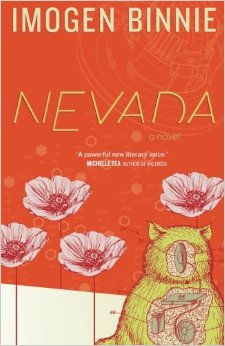 I’m an armchair anthropologist, and I like to keep my skills sharp by reading scientific non-fiction. Neanderthals and other non-human members of the genus Homo are my particular poison, and the last book I read on the subject was The Invaders by Pat Shipman. It looks at early human migration out of Africa through the lens of an “invasive species,” quite convincingly, and speculates on the role that the domestication of the dog by humans might have had in Neanderthal extinction.
I’m an armchair anthropologist, and I like to keep my skills sharp by reading scientific non-fiction. Neanderthals and other non-human members of the genus Homo are my particular poison, and the last book I read on the subject was The Invaders by Pat Shipman. It looks at early human migration out of Africa through the lens of an “invasive species,” quite convincingly, and speculates on the role that the domestication of the dog by humans might have had in Neanderthal extinction.
My wife and I host a book club with a fairly diverse selection of books: everyone tries to represent their interests or favorite genre. I’d already read the last selection, but was happy to re-read it: Nevada by Imogen Binnie. I’ve known Imogen for a while, as have a few other people in the club, which the person who picked it didn’t know, so Imogen called in after our discussion to chat with us about the novel as a nice treat. It’s a story about New York, small-town America, and being trans, and the voice of the protagonist of the first half, Maria, is clear and affecting.
Natalie Zutter:
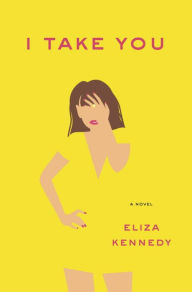 Neck-and-neck with my love of great speculative and SFF stories is fiction and nonfiction that examine the modern state of love. I will defend romance and chick lit to the end, but they have to have something unique to earn that support. One of my favorite books of 2015 was Eliza Kennedy’s I Take You, a Bridget Jones-esque romp that completely subverts readers’ expectations: To wit, it opens with a woman staring down the barrel at her wedding day and sleeping with everyone she can before she has to walk down the aisle. It’s a dark, sexy, unapologetic look at how commitment phobia grips today’s lovebirds, how with the option of so much choice it’s scary to tie yourself to one partner forever.
Neck-and-neck with my love of great speculative and SFF stories is fiction and nonfiction that examine the modern state of love. I will defend romance and chick lit to the end, but they have to have something unique to earn that support. One of my favorite books of 2015 was Eliza Kennedy’s I Take You, a Bridget Jones-esque romp that completely subverts readers’ expectations: To wit, it opens with a woman staring down the barrel at her wedding day and sleeping with everyone she can before she has to walk down the aisle. It’s a dark, sexy, unapologetic look at how commitment phobia grips today’s lovebirds, how with the option of so much choice it’s scary to tie yourself to one partner forever.
Someone else who knows plenty about the crisis of choice in contemporary dating is comic Aziz Ansari. For Modern Romance, he teamed up with sociologist Eric Klinenberg and polled real people at his shows, who willingly handed over their smartphones so Aziz could study unbiased evidence of the awkwardness of OkCupid messages, miscommunications over text, and the awfulness of ghosting. As someone who had more than my share of cringeworthy OkCupid dates before finding my guy through the site, I appreciate novels and irreverent yet in-depth studies that map out the shifting landscape of finding love in the age of technology.
Molly Templeton:
Do What You Love: And Other Lies About Success and Happiness by Miya Tokumitsu
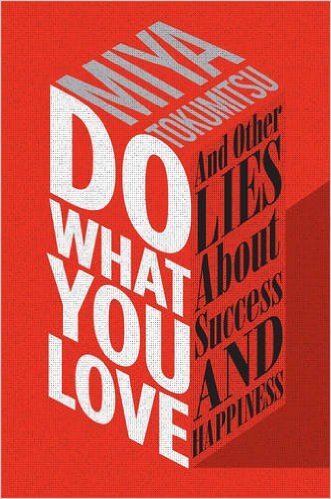 When you recommend a book with a title like this, people can hardly help but wonder about you and your job; for the record, I am very fond of mine. But I also love this book, which explores the way the “do what you love” mythology plays out in our culture. What used to be a corny mantra about finding happiness has transformed into a way for capitalism to ask—or require—more from workers, whether more time, more investment, more smiles, or more gratitude. Tokumitsu looks at idealized workaholics; emotional labor; the “hope economy” (internships and the idea that you have to pay your dues with little or no income, in hopes of eventual gainful, happiness-making employment); and the myth that if you just love your work enough, you’ll succeed at it. She writes, “As long as our well-being depends on income, and income, for most, depends on work, love will always be secondary as a motivation for doing it. Encouraging workers to pretend otherwise is disingenuous and exploitative.” Sharp, succinct, and ultimately hopeful, it’s the kind of book that has the potential to rewire your brain. In a good way.
When you recommend a book with a title like this, people can hardly help but wonder about you and your job; for the record, I am very fond of mine. But I also love this book, which explores the way the “do what you love” mythology plays out in our culture. What used to be a corny mantra about finding happiness has transformed into a way for capitalism to ask—or require—more from workers, whether more time, more investment, more smiles, or more gratitude. Tokumitsu looks at idealized workaholics; emotional labor; the “hope economy” (internships and the idea that you have to pay your dues with little or no income, in hopes of eventual gainful, happiness-making employment); and the myth that if you just love your work enough, you’ll succeed at it. She writes, “As long as our well-being depends on income, and income, for most, depends on work, love will always be secondary as a motivation for doing it. Encouraging workers to pretend otherwise is disingenuous and exploitative.” Sharp, succinct, and ultimately hopeful, it’s the kind of book that has the potential to rewire your brain. In a good way.
All the Rage Courtney Summers
I read a ton of great YA in the last year, some of it (like the overlooked The Unquiet; please go find this book if you like creepy stories about assassin teens, clones, and alternate earths) too SFF-y to fit here. But, if forced to pick one shining star among a shining stack of books, I’d hand you All the Rage, a story so full of hope and anger that it gives me goosebumps to think about it. (Also, I really wanted to punch someone in the face when I finished it.) It’s about closed-mindedness and privilege, victim-shaming and poisonous gossip, love and fighting your way through. Summers captures the incredible loneliness of being shunned in a small town, and the many ways adults can fail the kids they’re supposed to help and protect, and she does it through Romy, as flawed, angry, hurting, and wonderful a main character as I could ever hope to meet. It’s not an easy read, but that’s part of what makes it so stunning.










